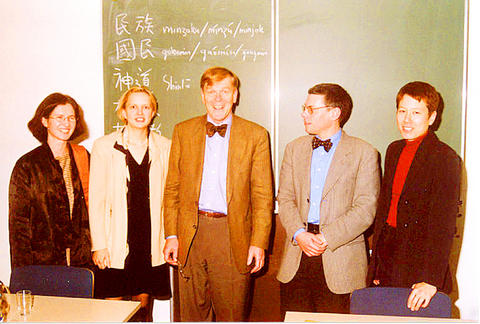The topic of unification continues to plague Taiwan's political parties, people and press. With the 17th anniversary of German unification quickly approaching, the Lung Yingtai Cultural Foundation (龍應台文化基金會) has invited Rudolf Wagner, a professor at Heidelberg University, to discuss the German experience of unification.
The lecture is titled German Unification: Popular Culture, Maoist Students, and the Socialist Disneyland, and will be held tomorrow at Zhongshan Hall.
Though Wagner will speak about German unification, he is no stranger to the cross-strait dilemma and Asian affairs. As one of Europe's foremost Sinologists, Wagner has done extensive research on Buddhism, Taoist philosophy and contemporary Chinese politics and the media.

Photo: courtesy of Lung Ying-tai Cultural Foundation
He coined the term "calculated over-reaction" to describe China's unexpected tirades against Germany for supporting human rights in Tibet, and the US for granting a visa to former president Lee Teng-hui's (李登輝) visit to his alma mater, Cornell, in 1996 as a means of extracting concessions out of the world powers.
Wagner's lecture will begin with a discussion on a concert held in 1976 by legendary West German singer-songwriter, Wolf Biermann, who expressed support for unification - an event that served as a catalyst for the eventual joining of East and West Germany. He will then go on to probe the complex issue of unification across the political divide while drawing on references from debates and events in popular culture.
Wagner has taught at the Free University of Berlin and is the director of the Center for East Asian Studies, University of Heidelberg, as well as a visiting scholar at Harvard University's Fairbank Center for East Asian Research. In 1992, Wagner was awarded the Leibniz prize and between 1996 and 1998, he served as the president of the European Association of Chinese Studies.

Wooden houses wedged between concrete, crumbling brick facades with roofs gaping to the sky, and tiled art deco buildings down narrow alleyways: Taichung Central District’s (中區) aging architecture reveals both the allure and reality of the old downtown. From Indigenous settlement to capital under Qing Dynasty rule through to Japanese colonization, Taichung’s Central District holds a long and layered history. The bygone beauty of its streets once earned it the nickname “Little Kyoto.” Since the late eighties, however, the shifting of economic and government centers westward signaled a gradual decline in the area’s evolving fortunes. With the regeneration of the once

Even by the standards of Ukraine’s International Legion, which comprises volunteers from over 55 countries, Han has an unusual backstory. Born in Taichung, he grew up in Costa Rica — then one of Taiwan’s diplomatic allies — where a relative worked for the embassy. After attending an American international high school in San Jose, Costa Rica’s capital, Han — who prefers to use only his given name for OPSEC (operations security) reasons — moved to the US in his teens. He attended Penn State University before returning to Taiwan to work in the semiconductor industry in Kaohsiung, where he

In February of this year the Taipei Times reported on the visit of Lienchiang County Commissioner Wang Chung-ming (王忠銘) of the Chinese Nationalist Party (KMT) and a delegation to a lantern festival in Fuzhou’s Mawei District in Fujian Province. “Today, Mawei and Matsu jointly marked the lantern festival,” Wang was quoted as saying, adding that both sides “being of one people,” is a cause for joy. Wang was passing around a common claim of officials of the People’s Republic of China (PRC) and the PRC’s allies and supporters in Taiwan — KMT and the Taiwan People’s Party — and elsewhere: Taiwan and

Perched on Thailand’s border with Myanmar, Arunothai is a dusty crossroads town, a nowheresville that could be the setting of some Southeast Asian spaghetti Western. Its main street is the final, dead-end section of the two-lane highway from Chiang Mai, Thailand’s second largest city 120kms south, and the heart of the kingdom’s mountainous north. At the town boundary, a Chinese-style arch capped with dragons also bears Thai script declaring fealty to Bangkok’s royal family: “Long live the King!” Further on, Chinese lanterns line the main street, and on the hillsides, courtyard homes sit among warrens of narrow, winding alleyways and